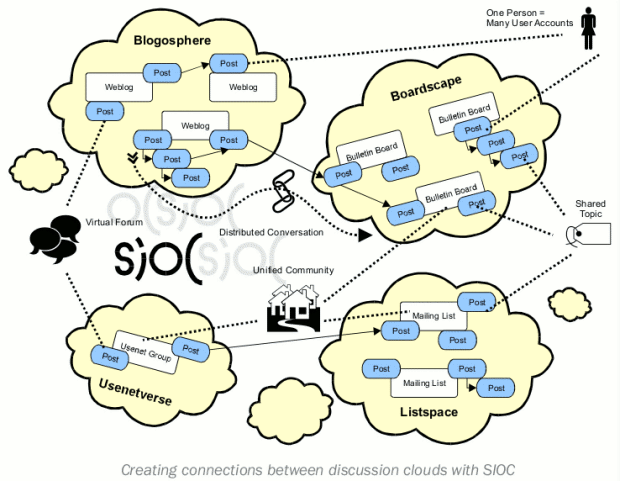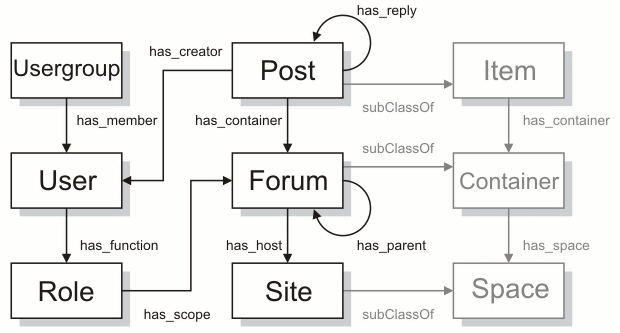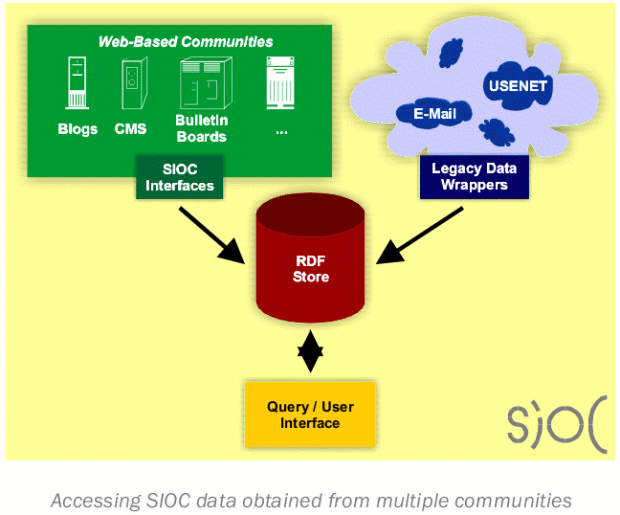Connect Discussions Between Blogs, Forums, and more with SIOC
Published 16 years ago by James Simmons
 Semantically-Interlinked Online Communities (SIOC for short) is a framework aimed at connecting online communities and discussions from blogs, forums, content management systems mailing lists, and anything else. In the current Web, communities such as forums and blogs are like islands - they contain valuable information but are not well connected or queryable. SIOC allows you to connect these sites, and enables the extraction of semantic information from unlimited discussion platforms.
Semantically-Interlinked Online Communities (SIOC for short) is a framework aimed at connecting online communities and discussions from blogs, forums, content management systems mailing lists, and anything else. In the current Web, communities such as forums and blogs are like islands - they contain valuable information but are not well connected or queryable. SIOC allows you to connect these sites, and enables the extraction of semantic information from unlimited discussion platforms.
SIOC consists of three components:
- The SIOC ontology
- Metadata producers (available for a number of popular blogging platforms and forums)
- Storage and browsing/searching systems

The core of SIOC is the ontology. It is a vocabulary that contains concepts necessary to express information contained in online community sites. Online community sites then provide information about their structure and contents to the outside world. This information is machine readable and structured using the SIOC ontology.
Since the information is already present inside these sites, all that is needed is to install a SIOC export plugin or extension. This information can be used by tools that understand SIOC data to suggest related information from other community sites
The SIOC Ontology
- Namespace:
- http://rdfs.org/sioc/ns
- Specification:
- http://rdfs.org/sioc/spec/
- Example:
- http://rdfs.org/sioc/spec/#sec-example
The SIOC ontology was created using RDF. SIOC is an open standard, and can be used by anybody in their internet discussion applications. You may reuse existing vocabularies and as a Semantic Web ontology SIOC can be combined with other popular vocabularies such as:
- Friend of a Friend (FOAF)
- Dublin Core (DC)
- Simple Knowledge Organisation Systems (SKOS)
The SIOC Core Ontology definitions:

SIOC PHP API
In the grassroots vs. ivory towers entry I stated that one of the keys to bringing about the Semantic Web was to create plugins for popular open source Web applications such as blogs, forums, and content management systems. SIOC has an API for PHP makes the development of plugins and metadata exporters as easy as possible.
The SIOC export API for PHP enables developers to create SIOC export tools without the need to get into technical details about how information is represented in RDF/XML - they are operating at the level of SIOC concepts instead. Thus, developers only have to deal with extracting content from their discussion system databases and then passing it to the API that will render SIOC data.
SIOC Metadata Exporters
The power of discussion methods via online community sites such as weblogs, bulletin boards and mailing lists lies in their number and the large amount of data that is available for harvesting.
Most blog engines already have RSS export functionality, and some boards are beginning to export RSS as well. Since the majority of these discussion engines are based on open source software or can be extended by using plugins, it is straightforward to modify existing export functions or to create plugins to generate metadata conforming to the SIOC ontology.
Available exporters:
SIOC for Developers
Producing SIOC data
- SIOC-Dev mailing list for developers at Google Groups
- The SIOC vocabulary for semantically describing discussion terms is available, and can be combined with other vocabularies such as FOAF, SKOS, and Dublin Core
- A SIOC PHP API has been provided for producing SIOC data from PHP-based applications
- You can write a SIOC exporter and connect your discussion system to the metadata-enabled Web
Using SIOC data
- A list of SIOC data sources can be found on the SIOC "Enabled Sites" wiki page, or by downloading the export list from PingtheSemanticWeb.com
- SIOC and the SPARQL query language decouple consumers of discussion data from the specifics of a particular blog or CMS engine
- A SIOC crawler and browser have been developed, and the open source code is available from the SIOC repository
- Other community applications using SIOC data include SemRadar, OpenLink Data Spaces and TalkDigger
- You can create your own SIOC browsers or other applications building on the above resources
SIOC for End Users
What can I do?
- Upload a SIOC export plugin to your blog site - there are plugins for WordPress, Drupal, DotClear, b2evolution and more.
- Add a SIOC button to your site.
- Install the Semantic Radar add-on to Mozilla Firefox so that you (and a ping service) will be notified if SIOC data is present.
What will we get?
- More visibility for our sites through services that make use of SIOC data (crawlers, browsers, visualisation applications)
- Enhanced methods for utilising tagging and semantic metadata
- More knowledge about a site's structure as well as its contents
- Increased connections between sites that are discussing complementary topics via this "SIOC-o-sphere"
- Relevant answers to questions rather than potentially-correct results from keyword queries, e.g. "find me all the blog posts by John and posts by anybody else who has commented on or linked to John's blog"
Applications for SIOC
- Create distributed conversations across blogs, forums and mailing lists
- Use as an enhanced export/import format, with access to either the entire content or summaries
- Enable publishing and subscribing to decentralised discussion channels and communities

SIOC can be used to connect many communities by their discussions, which can lead to unbounded possibilities as far as community interaction is concerned.
About the author
Trackback URL for this entry:
http://www.semanticfocus.com/blog/tr/id/772633/
Spam protection by Akismet
Post a comment


Recently Commented Blog Entries